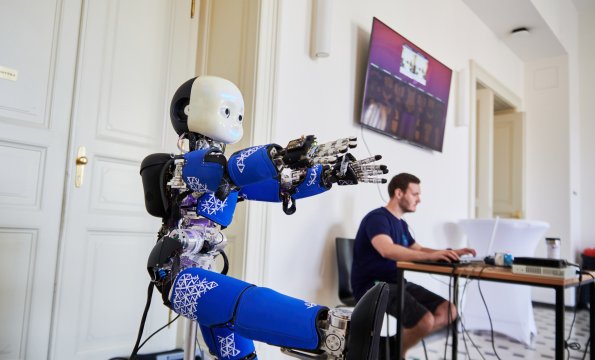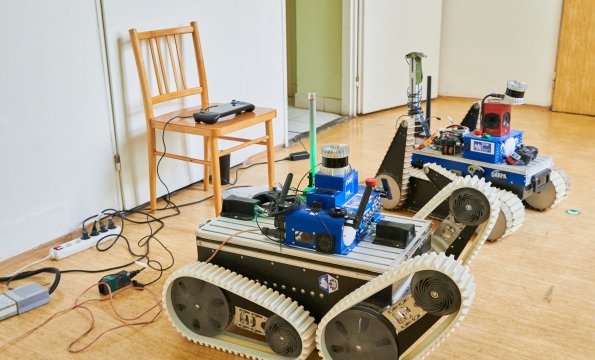
The five-year Research Center for Informatics (RCI) project’s results focused on research in artificial intelligence, robotics and informatics were presented in Prague by FIT CTU, FEE CTU and FNSPE CTU scientists. In lectures and live demonstrations, they presented humanoid, wheeled, tracked and walking robots, autonomous drones, applications in bioinformatics, cybersecurity and many other topics. The research and the purchase of equipment that the teams continue to develop, including a supercomputer for artificial intelligence research, was supported by the MEYS’s Operational Programme Research, Development and Education under the Excellence in Research call for CZK 580 million. Part of these funds were also used to involve 128 doctoral students in research. A total of 252 scientists from Czechia and abroad participated in the research topics supported by the RCI project. The presentation of the scientific outputs from the RCI project was also attended by Ing. Jozef Síkela, Minister of Industry and Trade.
“RCI targets cutting-edge research. It addresses problems in artificial intelligence and informatics across a broad spectrum. From theoretical computer science to applications in medicine,” said the head of the RCI project, Professor Jiří Matas, from the Department of Cybernetics at FEE CTU.
He described that the project consisted of nine research packages focusing, for example, on computer vision, computer graphics, machine learning, cybersecurity and the use of machine learning in medicine. Professor Matas, who has been involved in research on computer vision and target tracking using machine learning for a long time, stressed that the RCI also enabled faculty teams to strengthen their cooperation with top experts worldwide and invite them to their workplaces.
One of the important benefits of the RCI project is the purchase of a computer cluster worth more than CZK 121 million, which with its performance, ranks among the largest domestic supercomputers designed exclusively for non-commercial research purposes.
“The cluster mainly runs frameworks for learning deep neural networks, such as PyTorch and TensorFlow,” described Daniel Večerka from the Department of Cybernetics at FEE CTU. “Compute nodes, especially those with GPUs (graphics processing units), are highly used, and most of the time, some computation runs on all 104 available GPUs,” the expert added.
“In RCI, the Faculty of Information Technology was responsible for research in the topics of powerful computing and big data, embedded security and theoretical computer science,” said Professor Pavel Tvrdík, head of the Department of Computer Systems at FIT CTU, whose team, in cooperation with researchers from FNSPE CTU, dealt with the area of powerful computing and big data.
As part of the project, his team developed a new library for programming GPU supercomputers, a software tool for processing big astronomical data, new methods for modelling exoplanet atmospheres, efficient algorithms for modelling atomic nuclei, and more.
Professor Róbert Lórencz, head of the Department of Information Security at FIT CTU, presented the research results of the Embedded Security Group. He emphasized the relevance of research in this area, which addresses hardware security and reliability and deals with hardware components’ vulnerability and protection.
“The secure production and secure use of chips with their reliable identification is currently a fundamental requirement in the design of secure computer systems that affect almost all areas of government, industry, but also everyday life in the form of the Internet of Things, smart systems, automotive, etc.,” said Professor Lórencz.
Research in theoretical computer science was carried out by a group led by Professor Jan Holub.
“In the RCI project, we worked on a range of theoretical problems such as creating compressed indexes for big biological data, processing tree data structures or assigning objects to agents according to their preferences, which is used, for example, in so-called food banks. In cooperation with the Technical University of Berlin, a programme was developed to ensure distribution in these banks,” added Professor Holub from the Department of Theoretical Computer Science at FIT CTU. Thanks to support from the RCI project, FIT CTU acquired unique laboratory equipment, such as a Faraday cage or an experimental HPC cluster.






